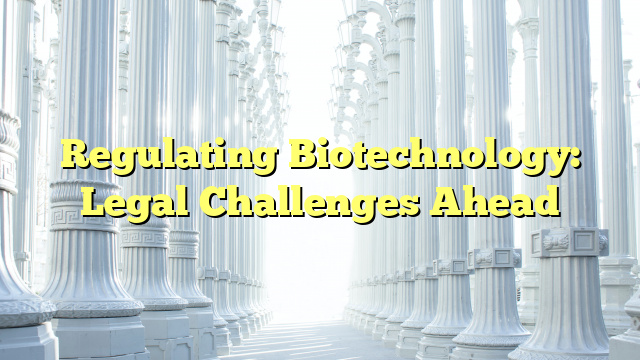Table of Contents
Legal Issues with Biotechnology
Biotechnology is a rapidly growing field that presents various legal challenges. One of the main issues is intellectual property rights. As biotechnology companies develop new technologies and products, they need to protect their innovations through patents. However, determining what can be patented in the biotech industry can be complex, as it often involves living organisms and genetic material.
Another legal issue is the regulation of genetically modified organisms (GMOs). Many countries have different regulations regarding the production and sale of GMOs, which can create challenges for biotech companies operating globally. Additionally, there are concerns about the potential environmental and health risks associated with GMOs, leading to debates over their regulation.
Challenges Faced by the Biotechnology Industry
The biotechnology industry faces several challenges, including scientific and technological complexities. Developing new biotech products and therapies requires extensive research and development, which can be time-consuming and costly. Additionally, the industry must navigate complex regulatory pathways to gain approval for their products.
Another challenge is public perception and acceptance. Biotechnology often involves manipulating genetic material, which can raise ethical and moral concerns for some individuals and communities. Building public trust and addressing concerns about safety and ethical implications is crucial for the industry’s success.
Government Involvement in Regulating Biotechnology
The government plays a significant role in regulating biotechnology to ensure safety, ethical standards, and fair competition. Regulatory agencies, such as the Food and Drug Administration (FDA) in the United States, assess the safety and efficacy of biotech products before they can be marketed. These agencies also monitor the ongoing safety of approved products and enforce compliance with regulations.
Government involvement also extends to intellectual property protection and patent laws. Governments grant patents to biotech companies to incentivize innovation and protect their investments. However, striking a balance between protecting intellectual property rights and promoting access to essential biotech products can be challenging.
Major Concerns about Biotechnology
There are four major concerns associated with biotechnology:
- Environmental Impact: The release of genetically modified organisms into the environment can have unintended consequences, such as the spread of modified genes to wild populations or the disruption of ecosystems.
- Health and Safety Risks: There are concerns about the potential health risks of consuming genetically modified foods or using biotech therapies. Extensive testing and regulation are necessary to ensure the safety of biotech products.
- Ethical Implications: Manipulating genetic material raises ethical questions about the boundaries of science and the potential for unintended consequences. Ethical considerations include issues related to human cloning, genetic engineering, and the use of biotechnology in warfare.
- Social and Economic Equity: Biotechnology has the potential to exacerbate existing social and economic inequalities. Access to biotech products and therapies may be limited to those who can afford them, leading to disparities in healthcare and opportunities.

